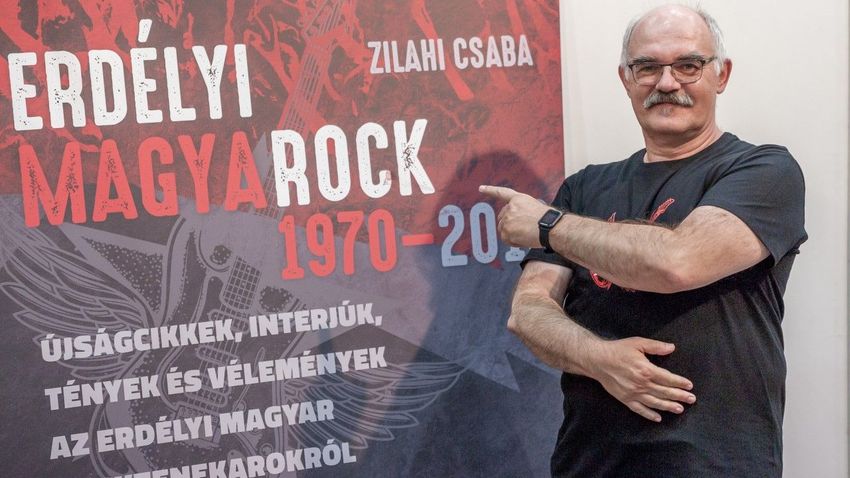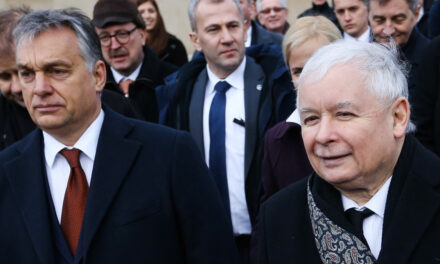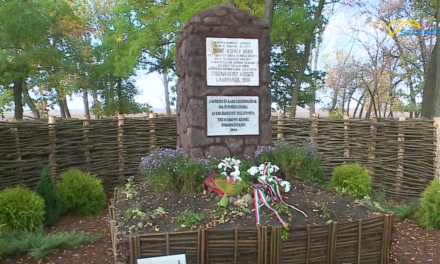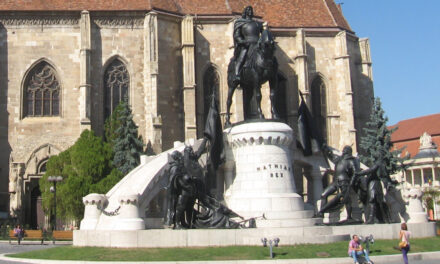Cover image: In front of the cover of the author's book enlarged to poster size (Photo: Attila Pinti/Liget.ro)
A gap-filling rock story was published under the title Erdélyi magyaRock (1970–2010), edited by the Exit publishing house in Cluj. Its popularity is proven by the fact that the book has gone on a triumphal journey throughout Transylvania, the invitations are increasing, the word is spreading and even the organizers in Hungary are interested. In addition to the author, the book's characters and former bands also perform at the book launches, resurrecting the legends of the past. The author of the volume is Csab Zilahi , who is the music editor of the Hungarian-language broadcast of the Cluj-Napoca Radio and a rock journalist.
We present details from the interview with him.
"Rock and roll captured me in the mid-seventies," says the author. – At that time, the first and best-known Transylvanian Hungarian rock band, Metropol, was already booming, but I was only able to buy their first record in 1978. I caught several of their concerts. My favorite was Semnal M. from Cluj, which sang in Romanian, but had Hungarian members as well. And, of course, I was there at the concerts of every Hungarian band that were held in Cluj, at the performances of Generál, LGT, Fonógráf, Color, Dinamit, but from the beginning of the eighties, none were allowed to enter Romania. There were also very good concerts with Hungarian bands in all styles, from hard rock and jazz rock to progressive rock and heavy metal. It's true, it wasn't possible to travel very much, so I mostly only saw those who took the stage in Cluj. After 1990, the world opened up, and for me, as a radio operator, my place was also where rock and roll was booming.
- In all artistic and scientific fields, it is said in Transylvania that if you really want to assert yourself, go to Budapest or Bucharest. Since Transylvania does not have a capital and does not have an appropriate professional infrastructure, a Transylvanian artist cannot become a star. In addition, the Transylvanian Hungarian artist is not adequately mediatized. How were Transylvanian rock bands able to prevail in the past and now?
"It's true, the two capitals share Transylvanian musicians to this day." If they want to gain national fame, they have to decide what language they sing in, and accordingly they can try to get into the musicians' clubs of one of the capitals. Of course, there are those who choose the English language for several reasons: the band is of mixed nationality, they want to speak to both Romanian and Hungarian fans, and they secretly hope to see if they can reach further west. Obviously, before the regime change, the road led only through Bucharest, but today the gates of Hungary are also open. If someone runs in Budapest, he will also be popular in his native Transylvania. The best example of this "feedback" is the Bagossy Brothers Company, which has already been followed by several others.
– Based on what aspects did you compile the volume?
– Since the pioneering rock bands quickly became known in the 1970s through the Transylvanian Hungarian public media and national music festivals, the first chapter presents this decade. By the 1980s, these opportunities had ceased, Hungarian TV and radio programs were banned, so the genre became regionalized, i.e. the bands were only known around their hometowns. This lasted until around 2010, so in the following chapters I present the bands of each region, with lexical data and contemporary newspaper articles. It is important to emphasize that the information in the volume comes first-hand from the bands, not from the Internet. All the more so because many of them were active in the days before the Internet.
- What about today's Transylvanian bands?
- Fortunately, in the last decade, Hungarian pop music circles have become aware that the genre also has excellent practitioners in Transylvania, that rock music across the border is an integral part of Hungarian rock. Today, the bands from Székelyföld can apply for serious subsidies, they have opportunities that the teams from Györgyó, Sepsiszentgyörgy, and Marosvásárhely did not even dare to dream of 15-20 years ago. From this point of view, a new era began around 2010, which is why I wrote in the volume about the bands of the previous four decades, the era of heroes, those who kept hitting walls, who had no chance to break out, but who could best express their dreams and desire for freedom in the language of rock.
Source: mno.hu (Zenóbia Zorkóczy)













